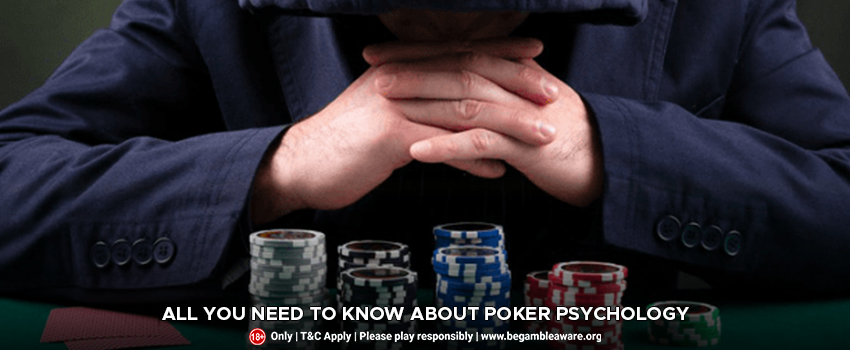All You Need to Know About Poker Psychology

Poker is not for the weak of heart. But it is for the strong of mind. Bad beats and downswings can have a negative impact on your poker psychology. However, participating in tournaments can make a big difference in our mental health.
Variance in poker is a sign that you are not in control of certain things. Although you can put your chips in preflop with pocket Aces, that doesn’t necessarily mean you will succeed. You can only do your best and let the poker gods decide the rest.
There are ways you can play your best. Mental toughness is one of the best ways to improve your casino poker game. Your game will benefit if you are ready for the inevitable swings and have mastered your psychology. These are some tricks that will help you improve your poker psychology.
1. Know Yourself
Poker players can be some of the most delusional individuals on the planet. We don’t like to play too many hands. We want to see the flops. We didn’t raise it at an inappropriate time. It was the opponent’s fault that he didn’t fold when he was supposed to. Every mistake made at the poker table has an equivalent and opposing explanation. Bad luck is what we can blame when all else fails.
2. Ego and Competition
Competition brings out the fragile egos in everyone, but poker makes it even more difficult to lose. Losing money is not something anyone enjoys, but it brings out the best in us: our pride.
Poker is full of machismo. To admit that your opponent may be smarter, stronger, or just plain more skilled than you is to admit a grave weakness. Poker minds will go to great lengths to avoid this revolting thought.
Confidence is crucial, and it’s not a mistake. Without confidence, you won’t be a successful poker player. You must believe in yourself to be able to withstand the swings. When does confidence become excessive pride? Self-knowledge is key. Being uncompromisingly honest with oneself at the poker table is a valuable skill.
It’s easier said than done. Losing is hard. To add that pain to the fact that you are responsible for the loss is like pouring lemonade on a wound. It is easier to blame someone else for a difficult loss than to consider the possibility that we did not play the hand correctly.
3. Tilt and Poker Self-Delusion
Tilt is a term that describes poker self-delusion. A player who plays below his skill level due to emotion is called and almost always loses money. Tilt players throw away their money – either by the handful or in a steady stream of small losses.
This is because they make decisions based on anger instead of considering the consequences. Tilt is the epitome of poker self-delusion, as tilt players rarely admit to anything being wrong.
Recognizing that you are on tilt is step one. This is not an easy task. This is a difficult task. You can trigger anything, from an annoying opponent to a specific type of loss. Anything that causes you to feel upset or negatively raises your emotions is a trigger.
The second step in overcoming a tilt involves leaving the game. Even if you only have a few minutes, get up and do something, as long as it does not involve losing your money in a poker tournament. You will save a lot of money throughout your poker career by learning more about yourself as a player.
4. Your style of playing
It would help if you looked at your playing style to get deep into your poker psyche. The main thing is why you started playing poker. Are you playing to socialize? Because you love the thrill of competition? To prove something? No matter what the reason or combination of reasons it is, your style will reflect that.
Self-honesty can be the solution. Although you can study hand histories and buy fancy software to calculate percentages, nothing will make you a top-notch poker player like you. If you don’t apply that knowledge when it matters, you can’t learn the correct poker strategy.
5. Understanding Your Opponent
There are many poker players, from the casual player who doesn’t mind losing some money as long as they have fun to the serious player who holds onto every single chip for his life.
You must be able to read all the cards to play at a higher level. Only by understanding your opponent’s hand can you place him on a variety of hands. This will allow you to make correct decisions most of the time.
6. It’s all about putting it together
The real psych-out games begin once you have a clear understanding of your opponent and yourself. This requires higher levels of thinking. Level 1 players think only about their cards. Level 2 players consider what their opponent holds. Level 3 is when you think about what your opponent thinks of you. This is not possible without a good understanding of your opponent’s thoughts and how they are reading you.
Conclusion
There is no substitute for hard poker mathematics. When used with a solid poker strategy, psychology can bring a lot of depth to your game and your bankroll. This creates an unbeatable combination. You can have the best of both the human and the mathematical side of the game by opening your eyes.
Name: All You Need to Know About Poker Psychology
Posted On: 23/09/2021
Author: Cameron Riddell


